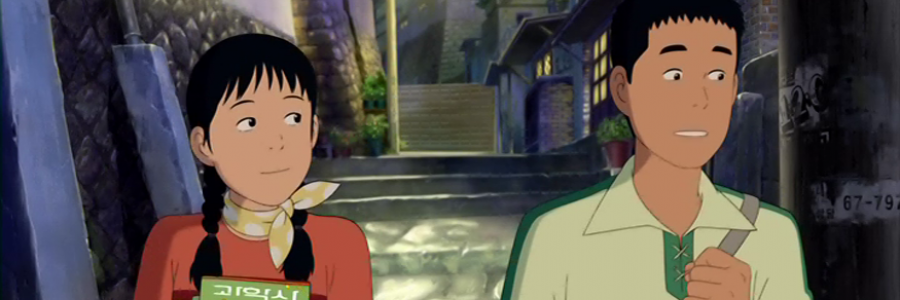Green Days: Dinosaur and I is a South Korean animated film from 2011, a sweet coming-of-age story very much in the spirit of Studio Ghibli's Whisper of the Heart. Yeah, I know, it's an odd title. It makes more sense once you watch it, and if you do, watch the credits for more context.
It's set in South Korea in the 1970's, an era of growth and modernization for the country, which perfectly compliments the themes of the film: a high school girl facing her more childish behaviors and growing out of them. So, yes, it's a coming-of-age film, but not one set against a dramatic backdrop of war or massive social change. It's about normal people dealing with normal problems, which is a refreshing change.
There's a mild love story, but as the protagonist says at one point, "I like friendship more than love." It's more about two young people getting to know each other better than a sweeping love story, and that's actually another theme of the film: that you don't have to follow the standard pattern of life.
As a result, this is not a film of high action and adventure; scenes play out in a wonderfully natural rhythm that's neither frenetic nor lazy. It reminds me a bit of a Coen brothers film in that way, where they often focus on blue collar people who aren't abducted by aliens nor save the world.

Unfortunately, budget constraints result in a low frame rate which looks a little herky-jerky at times, and the character models are rarely shadowed, creating an oddly flat feel to the characters despite the beautifully painted backgrounds. While the film never looks ugly, it rarely elevates itself into the beauty you get from a higher-budgeted project.
However, more important for a film like this is facial expression, and the characters go through an impressive range of subtle emotions. You really understand what the characters are thinking and feeling, especially as several scenes refreshingly avoid constant dialogue and sometimes just let the characters look at each other and react. The staff also keep the characters impressively on-model throughout, particularly impressive for the budget.
I listened to the Korean dub, and I don't know enough about Korean speech patterns to know how good the dub was. Nothing leapt out as grating, though.
All told, Green Days is a sweet story of personal growth, that manages to avoid being either too sappy or too gritty. Despite its nearly 2-hour running time, I found myself fully engaged the entire time.
Analysis - Spoilers Below

I want to go back to something I mentioned at the beginning of the review, that this is about a teenage girl growing out of childish things.
It's surprisingly rare to see a coming-of-age film that focuses so much on the protagonist's personal growth. So much of this film focuses on Yi-rang's everyday life and decisions. Let's look at some of these sub-plots:
She deliberately loses a foot race because she's embarrassed of public failure. This complicates every encounter with her old racing friend, and she eventually faces that in another race at the end of the film. She doesn't have an epiphany which allows her to run again; she decides to run while she still has that fear, and in running the race she resolves that fear.
She becomes infatuated with Love Story's portrayal of infatuated lovers, holding that up as an ideal. As she grows closer to Cheol-soo, she realizes that she enjoys hanging out with him more than if she were passionately in love with him.
She becomes friends with one of the most popular girls in school, only to discover that she's nihilistic and has no real plans for her future. Her idol is hollow.
The boy begins the film with a noticeable stutter, which subsides as he spends more time in natural conversation with Yi-rang. He has no epiphany either; he has to put in the hours to slowly overcome his impediment.
And then we meet the boy's uncle, who has a real setback: he can't speak. And yet he manages to have the most interesting life of all of them, demonstrating that drawbacks don't have to hold us back. All these problems that are worrying the protagonists might not actually be such big problems.
And this is all set against the backdrop of South Korea in the 1970's: a country growing and developing, where industrialization was bringing all sorts of new things to the common person. It was the country's adolescence, in a way, and knowing how far the country would advance invites the viewer to wonder what the characters' futures will be like.
That's one of the primary reasons I found myself so enchanted by the film. It's not just about an adolescent going through difficult times; we see her grow and we end the film excited about her future, even though we have no idea exactly what it'll be. And isn't that life?

![[Atom feed]](/user/themes/geek-archaeology/images/atom-feed.png)
![[RSS feed]](/user/themes/geek-archaeology/images/rss-feed.png)
![[iTunes podcast feed]](/user/themes/geek-archaeology/images/itunes-feed.png)